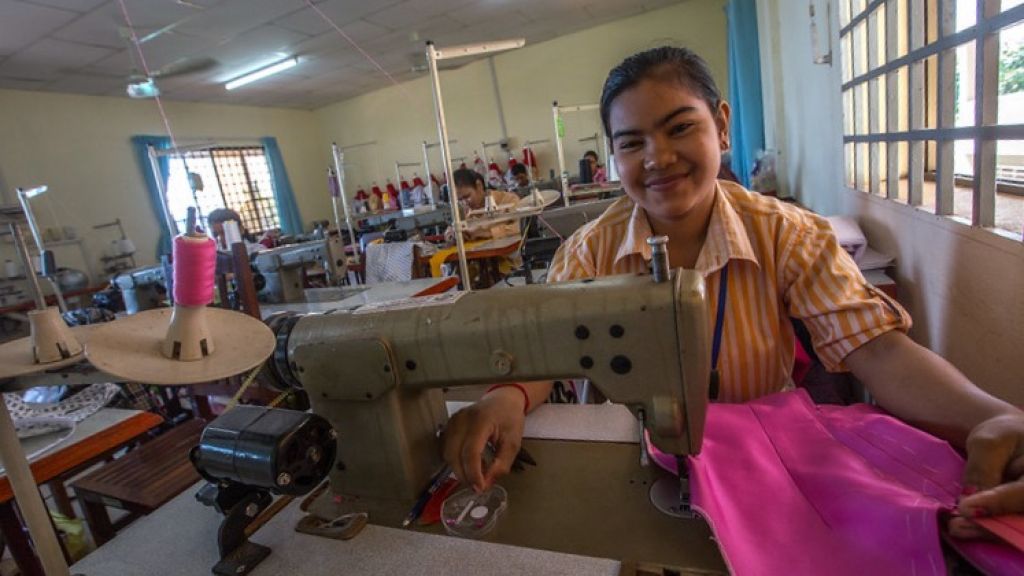Industry 4.0 Could Have Transformational Impact on Skills and Jobs in Cambodia — ADB Study

A garment industry worker at a regional training center in the Siem Reap city, Siem Reap province.
PHNOM PENH, CAMBODIA (20 January 2021) — Cambodia should consider developing industry transformation maps in key sectors to enable the transition to the fourth industrial revolution (4IR) with adequate investment in skills development for new and repositioned jobs, according to a new study by the Asian Development Bank (ADB).
The finding is one of six key recommendations emerging from ADB’s study Reaping the Benefits of Industry 4.0 Through Skills Development in Cambodia. It is part of a four-country study of ASEAN nations that also includes Indonesia, the Philippines, and Viet Nam.
The study examines the garment and tourism industries in Cambodia both of which are important for growth, employment, international competitiveness, and 4IR. It finds that 4IR technologies will eliminate jobs in the garments and tourism industries, but these would be offset by increase in demand arising from higher productivity, potentially generating net job increases of 39% and 2%, respectively.
While the government and industry are keen to promote 4IR skills, employer surveys in the two industries reveal limited understanding of 4IR technologies. For example, only 28% and 35% of garment manufacturing and tourism employers surveyed agreed or strongly agreed when asked whether they have a good understanding of 4IR technologies and their relevance to their companies. Employers in Cambodia display a much lower understanding of 4IR than those surveyed in Indonesia, the Philippines, and Viet Nam.
Despite the overall positive net employment effect in both industries, the study warns there is no guarantee that displaced workers can seamlessly move into newly created jobs without adequate and timely investments in skills development. Job displacement is also more likely to impact women which make up around 81% of Cambodia’s garment manufacturing industry.
“While 4IR could be transformative for jobs and skills in Cambodia, we must address the potentially disproportionate impact on women,” said ADB Country Director for Cambodia Sunniya Durrani-Jamal. “We must improve knowledge of 4IR technologies and their benefits, support enterprises including small and medium enterprises to adopt advanced technologies, and offer support for retraining and reskilling programs including through tax incentives to ensure that no one is left behind.”
The study calls for new approaches to strengthen inclusion and social protection for entry-level workers, those at risk of job displacement, and those who need upskilling.
The study calls for Cambodia to develop technical and vocational education and training programs with dedicated 4IR credentials in garment manufacturing and tourism, and flexible and modular skills certification programs that recognize skills attainment outside traditional education channels.
The study also calls for implementing incentive schemes for firms to train their employees in 4IR, which could be led by the Cambodia Skills Development Fund. In tourism, policymakers are urged to leverage growth of smartphone application developers to build 4IR readiness, ensure training in communication and social skills, and foster stronger coordination between training institutions and employers.
Employers surveyed in garment manufacturing (90%) and tourism (79%) reported that graduates hired in the past year were not adequately prepared for entry-level positions. This contrasts with the perception of training institutions, almost 60% of which stated graduates were adequately prepared.
“As 4IR technologies spread rapidly, extensive investments in digital skills will improve the chances of the young and old to access higher-quality jobs and lower the risk of job losses,” said ADB Principal Education Specialist Shanti Jagannathan. “Now is the time to rethink delivery of skills using virtual platforms and mobile technologies, and develop agile training institutions with courses and credentials that match market needs”.
While the coronavirus disease pandemic is accelerating digital transformation, the study finds that companies deploying 4IR technologies are likely to recover faster from the disruptions caused by the pandemic and be more resilient in the future.
ADB is committed to achieving a prosperous, inclusive, resilient, and sustainable Asia and the Pacific, while sustaining its efforts to eradicate extreme poverty. Established in 1966, it is owned by 68 members—49 from the region.
This post was originally featured on the ADB website.
Last Updated: 27 January 2021
